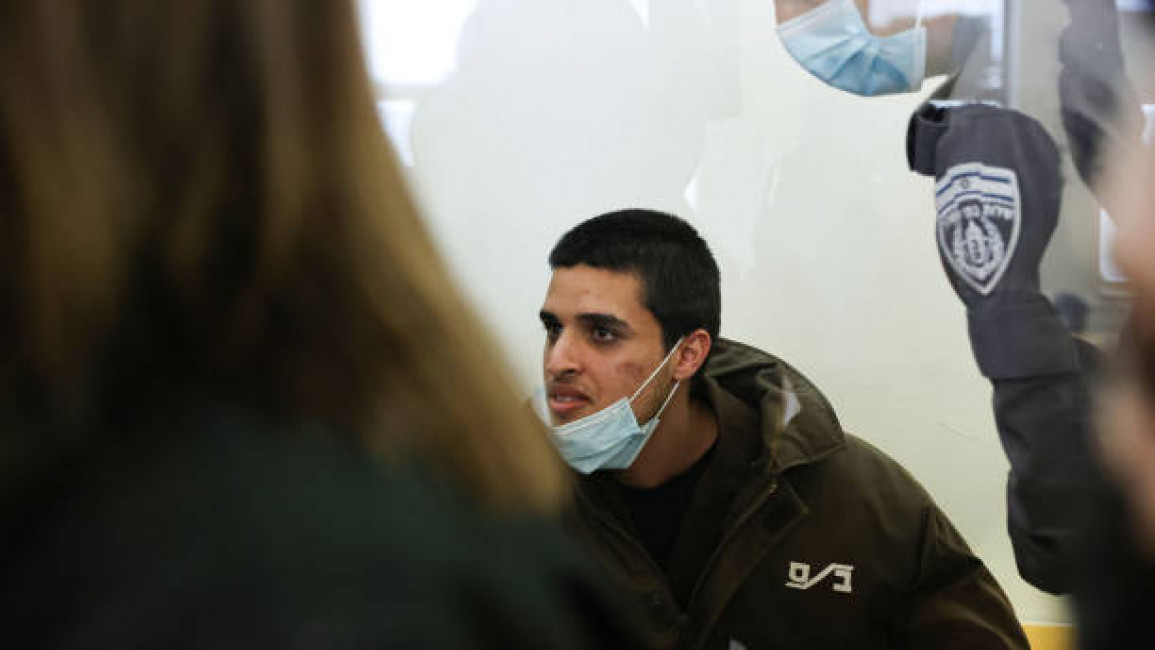Palestinian short film about Ahmad Manasra attracts ire of Israeli social media
A Palestinian short film spotlighting the story of Ahmed Manasra, a Palestinian prisoner held by Israel, and distributed entirely through social media platforms has attracted anger from various online Israeli activists.
The short film, titled "Empty Place", focuses on Manasra, who was arrested in 2015 at the age of 13 after he was hit by an Israeli police car.
An Israeli user first shared a clip on Twitter, that he later deleted, showing the film crew shooting the scene of Manasra's arrest.
The actor playing Manasra's role was lying on the floor with staged blood around him and actors playing Israeli settlers surrounding him and hurling insults at him; a near-exact replica of Manasra's arrest in 2015.
"Palestinians "stage" a killing, using actors dressed as Jewish and @IDF. These fake images will be used to incite violence and misery. @amnesty @hrw will use it as "evidence"," the user commented about the clip.
"My name is Ahmad Manasra" (in 2015 - I was 13).
— WarCrimeReport (@WarCrimeReportZ) April 13, 2022
A terrified injured 13 year old boy is shown in this video, with an Israeli settler shrieking at him, "Die you son of a whore!"
He has lived a third of his life in an Israeli jail." #FreeAhmadManasra #الحرية_لأحمد_مناصرة pic.twitter.com/fKOrnvinjx
The clip then circulated on Facebook, accompanied by a copy-pasted comment, which says, "Pallywood at its best. The Palestinians are faking scenes where a child is shot by Israeli soldiers. I wish they spent all these resources to promote peace rather than propaganda."
"We don't know where did they get the images of the shooting from," Farah Tbeileh, the film producer told The New Arab.
"We immediately published the original clips of the film shooting alongside an explanation," she said. "We were very surprised because the film had already gone viral and it was no secret."
Manasra was sentenced to a 12-year-term in 2016 after being charged with helping his cousin in stabbing an Israeli in Jerusalem.
His cousin was killed during the act, while Manasra, who had not taken part in the attack, was ran over by an Israeli police car and lynched by a mob of Israeli settlers before being taken into custody by the Israeli security forces.
His sentence was later reduced to nine.
Shortly after his arrest, a clip from Manasra's interrogation was leaked, showing an Israeli interrogator shouting at him as Manasra kept repeating that he didn't remember anything. This scene is also reproduced in the film.
Ahmad Manasra who since the age of 13 has been in Israeli detention. Below is a reminder of what he has had to endure. It is also a reminder to all those who would shield Israel from international scrutiny & accountability.#FreeAhmadManasra pic.twitter.com/tKUGmYhaCv
— Chaimaa Oultata (@oultata) April 20, 2022
In late March, Manasra's case returned to the public eye after an Israeli Supreme Court hearing decided to grant him parole after an appeal was submitted by his lawyer.
In the same period, reports from his lawyer and human rights groups indicated that Manasra was experiencing severe depression and anxiety due to the conditions of his detention. Palestinians launched an online campaign to gather support for Manasra's case prior to the court hearing.
"It was during the campaign and motivated by it, that we decided to make the short film," Tbeileh noted.
"We are a team of friends who work together as freelancers in video production," she said. "Everybody volunteered and we got it done in two days, one day of preparation and one day of shooting, with zero cost."
Zabarka, the lawyer of Ahmad Manasra;
— Palestine captives (@Palestinecapti1) April 20, 2022
“Ahmad was arrested when was only 13-year-old child, and since then his spirit and hope for life have been killed.
What I fear is that we will wake up to sad news about Ahmad Manasra.. ”#الحرية_لأحمد_مناصرة #FreeAhmadManasra pic.twitter.com/ljgjhCRSEd
The film focused on the psychological effects of growing out of childhood in prison, as well as Manasra's experience, where he is seen asking his lawyer if it was a sin to commit suicide because "he couldn't take it anymore."
"That scene is real, the lawyer told it to us and we adapted it to the scenario”, explained Tbeileh.
"But the film isn't only about Ahmed Manasra," she stressed. "It is also about the tens of thousands of empty places within the homes and families of Palestinian prisoners and 'martyrs'."
FREE AHMAD
— R🇰🇼🇵🇸𓂆 (@rourealr) April 12, 2022
STAND WITH JUSTICE🙏🏻#FreeAhmedManasra #unchilding #Palestine pic.twitter.com/K8kHLdBr4i
The Israeli Supreme Court dropped the terrorism charges off Manasra's case and referred it back to the parole committee for a final ruling, which is yet to be decided.
According to human rights groups, some 160 Palestinian children are still detained in Israeli jails.



